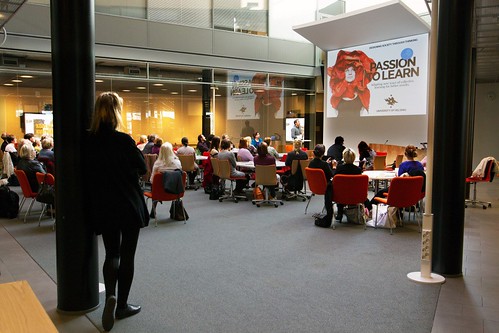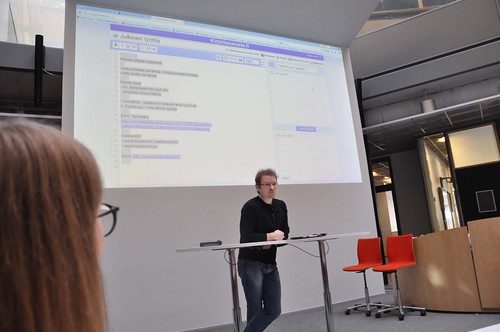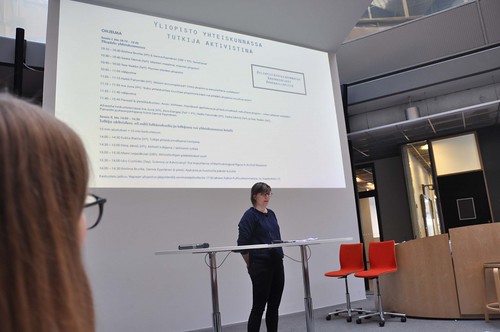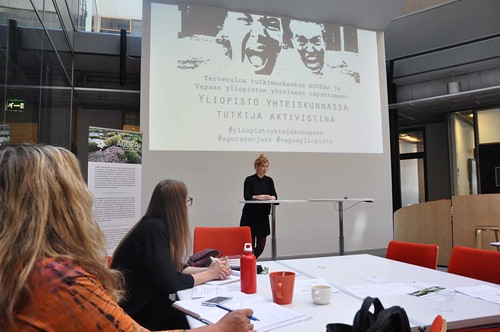June 4th and 5th we organised a workshop “A global epidemic of mental ill-health? Interdisciplinary perspectives on the educational implications of reconfiguring social, economic and human crises” together with Critical Educational Psychology Centre for the Human CEPCH (University of Sheffield). On Thursday the 4th we had four keynotes and a panel discussion at Minerva Plaza. On Friday the 5th, people that had applied for the paper sessions presented their papers to each other and the keynote speakers.
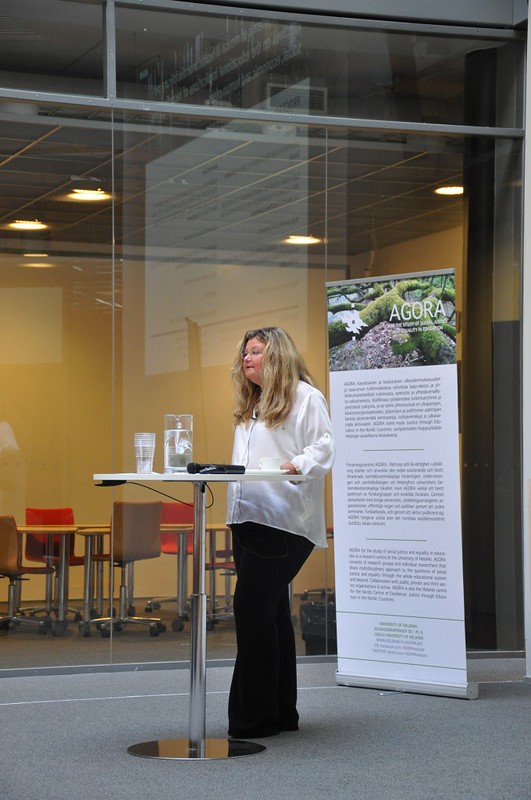
On Thursday, Professor of social justice and equality in education (tenure track) Kristiina Brunila from University of Helsinki opened the seminar.
INTRODUCTION: ERA OF MULTIPLE CRISES
A number of researchers across the world are arguing that we are experiencing a crisis in education, one that is taking place within the larger crisis of capitalism. In Finland the responses to these crises towards young people have focused on attributes and competences of emotional well-being and mental health. In various educational settings typical initiatives have included therapeutic activities such as interventions for emotional well-being, activities for raising self-esteem, emotional education, and all kinds of direct behavioural training. This paper focuses on youth education that has been permeated by the therapeutic governance where the question is not whether to intervene but which interventions are more effective. Therapeutic governance refers to management of populations‟ psychology, and its significance for security. Therapeutic governance makes a link between psychosocial well-being and security, and seeks to foster personalities able to cope with risk and insecurity. So an individual’s sense of psychosocial well-being is not simply of personal concern, but is an aspect of good governance.

The first keynote speaker was Kathryn Ecclestone, a Professor of Education from University of Sheffield.
CHANGING UNDERSTANDINGS OF CRISIS: THE IMPLICATIONS OF ‘VULNERABILITY’ IN A ERA OF PSYCHOLOGICAL MALAISE
In policy and everyday discourse, meanings and understandings of vulnerability have shifted from the original Latin meaning of ‘being wounded’, and the corresponding idea that a minority are at risk of wounding or harm from serious material, physical and psychological conditions to much more diffused meaning where growing numbers of groups and individuals are deemed to need sympathy, help, support or intervention. At the same time, a willingness to acknowledge and disclose one’s vulnerability is an attribute of someone authentically and empathetically human. One outcome is the privileging of education and workplace settings as key sites for the inextricable intertwining of vulnerability, support and interventions to ‘build resilience’ and develop ‘survival strategies’.
This paper draws on a growing genre of research and critique that responds to the pathologisation of vulnerability by policymakers and many practitioners by recasting it as a springboard for resistance to capitalist crisis. It takes me into new questions and uncertainties about how to position myself in debates about vulnerability and their typical depictions of crisis and its human subjects. After reviewing the key parameters of these debates, I ask whether we face a different sort of capitalist crisis from the one we thought we were facing, one of growing psychological malaise and the possibility of psychological collapse amongst its human subjects. If so, critical perspectives on vulnerability currently available to us are no longer adequate for understanding this crisis.
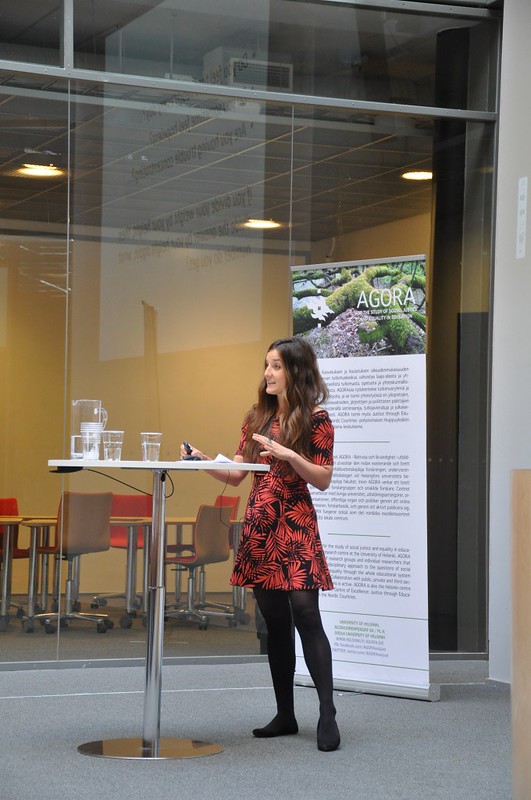
The second keynote was by China Mills, a Lecturer in Critical Educational Psychology from University of Sheffield.
MAKING YOUR SAD ASS FAT, AND YOUR FAT ASS SAD: MAPPING EPIDEMICS OF NON-INFECTIOUS DISEASE
Do you feel tired nearly every day? Are you having trouble concentrating? If you divide your weight by your height, then divide the answer by your height again, what number do you get?
Sadness and fatness have become diseases. Diseases that are so prevalent, we are told, they are epidemics. Transformed through diagnostic check-lists and numbers on an index – sadness becomes depression, and fatness becomes obesity. What are the implications of understanding depression and obesity as a) ‘diseases’, and b) epidemics?
Epidemiology – the study of epidemics – is now applied to measure rates of depression and obesity. But depression and obesity are not infectious diseases. If there is no infection, no bacteria travelling from one person to another, then what causes these new epidemics? And how do non-infectious diseases spread? The paper will trace the spread of non-infectious epidemics across a landscape of global capitalism that creates and sustains inequality, insecurity and poverty, saturated with cheap high calorie food and drink. Closely reading disease awareness campaigns and educational material (some of which is produced by the pharmaceutical industry), the paper will trace how capitalist economies may not only make us sad and fat, but through eliciting the tools and techniques of the psy and neuro disciplines, may reconfigure and rename that sadness and fatness as diseases, as epidemics, in need of individual, and often, chemical cure: psychotropics and diet pills.
For while, sadness and fatness may both be ‘symptoms’ of capitalism (and particularly of the different kinds of poverty that form its core and periphery), they are ‘symptoms’ that capitalist economies can then profit from as they seek to manufacture the ‘cure’. Therefore, the companies that profit from making us fat also profit from making us (try to be) slim, while the companies that make us sad also profit from making us (try to be) ‘happy’.
And so this paper will argue that when mapping how non-infectious diseases spread, we need to turn our attention to how something comes to be defined as disease and as an epidemic (and by who?) in the first place. The paper will explore how it is the framing of an experience as an epidemic that individualizes, biologizes and pathologizes ‘symptoms’ of capitalist crises, reconfiguring them as ‘symptoms’ of individual crisis – as ‘mental illness’. Through a process of psychologization and psychiatrization (of economic crisis, poverty, and inequality), these ‘diseases’ then come to be understood as products not of political economy but of individual behaviour and psyches, lipids and neurochemicals; where the site of transformation is the individual, and not the economic, body, and the tools of transformation can be swallowed in the form of a pill.
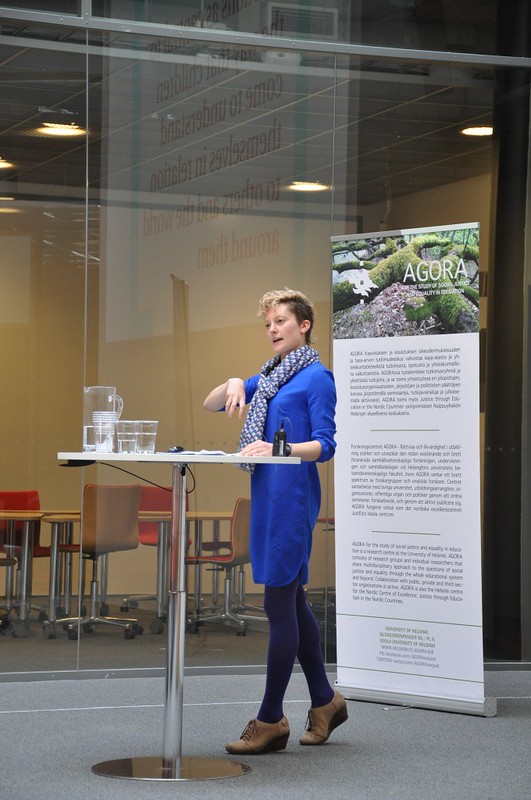
The third keynote speaker was Lisa Procter, a Lecturer in Early Childhood Education from University of Sheffield.
“IT’S LIKE SOMETHING YOU DON’T MEAN TO DO, BUT A BIT LIKE YOUR FEELINGS CONTROLLING YOU”: MOVING BEYOND “EMOTIONAL LITERACY” IN EARLY CHILDHOOD EDUCATION
This paper reflects on the ways that the emotional literacy agenda has entered into early childhood education in England and realised through the increased number of emotion-orientated interventions targeted at children. Within my own ethnographic research in a primary school context emotional literacy interventions included teaching children techniques such as breathing exercises to manage ‘unwanted’ emotion and counselling skills training programmes for children to support their peers through peer-conflict. Many teachers (but not all) who used these approaches valued them; associating such methods with children’s empowerment and voice because they perceived that they enabled children to self-manage their own school lives. At the same time, academics have met these interventions with suspicion, claiming that they target children’s subjectivities as a site of governance.
In this paper I argue that early childhood education policy positions emotion in opposition to rational thought. This is despite recent literature within the sociology of emotions disputing such historically produced binaries. Within the policy terrain children’s awareness of their own emotional responses is deemed essential to an education that enables children to control and overcome feelings that are categorised as barriers to learning. I suggest that this way of understanding the relationship between emotion and learning fails to account for new understandings of the interplay between emotion and embodiment. I draw on examples from my own research to show how children draw on their own embodied histories as they navigate the emotional landscapes of schooling. I argue that the education children receive, which aims to intellectually objectify childhood emotion, does not recognise the role of children’s embodied knowledges in producing and shaping their ‘in-the-moment’ encounters with peers and places. These ways of relating to and with others and the world are not necessarily available to children’s consciousness, as one boy states ‘it’s like your feelings controlling you’. I argue that embodied emotion is central to children’s production of social relationships and identities. I suggest that connecting emotion and embodiment, affords new opportunities for seeing emotion as central to knowledge production rather than, as reflected within the current emotional literacy agenda, a barrier to it. I also suggest that our emotional responses can act as a learning resource but not in the ways conceived within current educational policy. Rather than attending to emotions in order to enhance self-regulation (i.e. learning to fit into established structures), we can instead explore collectively what these responses reveal about the wider socio-political contexts through which emotions are produced and in which our emotional lives are entangled.
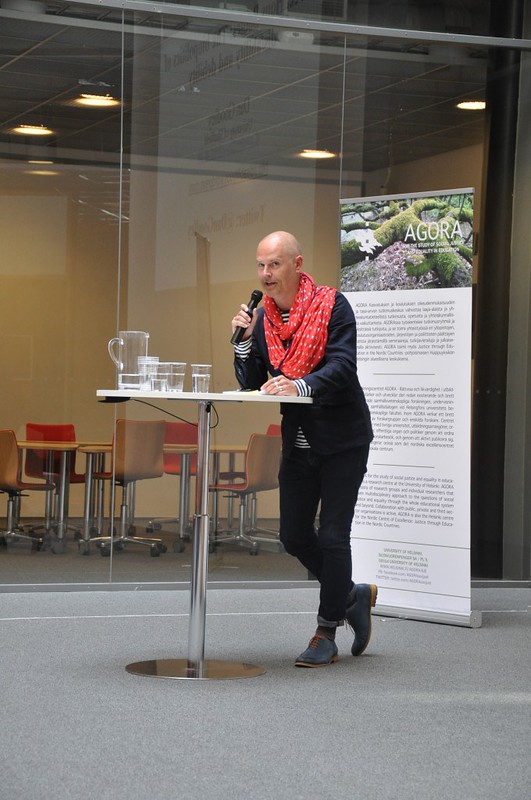
The last keynote of the day was by Dan Goodley from University of Sheffield.
PRECARIOUS BODIES: THE BIOPOLITICS OF DIS/ABILITY AND DEBILITY
This paper will examine the paradoxical yet complementary societal emphases, which currently prevail, on the healthy citizen and an epidemic of disability diagnoses. Drawing on interviews with parents of disabled babies and young children, the analysis will delve into the co-constitution of dis/ability; identify the gains and losses associated with accruing a dis/ability identity; illuminate the processes of pathologisation alongside entitlement and consider the limits and excesses of naming dis/ability. Not only is the notion of a body outside of culture a fantasy, in actuality, our bodies are moulded by alienating choreographies of capitalism. All of us are left lacking in the market; debilitated by the dance of capital. We therefore need our interconnections, communities and alliances more than ever. The paper is split into a number of sections:
- Social bodies: ab/normal hands and fingers
- Biopolitical bodies: pathologisation alongside entitlement
- Dis/abled bodies across the DSM 5 and transhumanist globe
- Capitalist material bodies: Labour, alienation, impairment
- Desiring dis/abled bodies: the political potential of debility
- Conclusion: A long, slow death
While the paper offers a sobering account of the dangerous dealings of the precarious body, we move to a more affirmative space (through the musings of queer theory) where dis/ability is proffered as the place through which to develop debility politics.

After all the keynotes, there was a panel discussion led by Elina Vaahtera, Katariina Mertanen and Anna Mikkola from University of Helsinki.
You can watch Thursday’s keynotes and panel discussion from Unitube.
